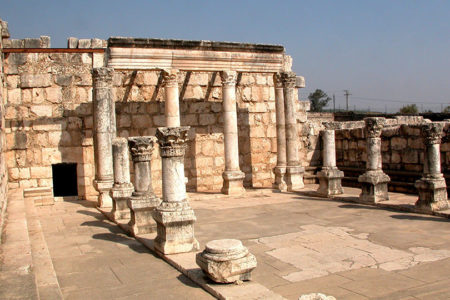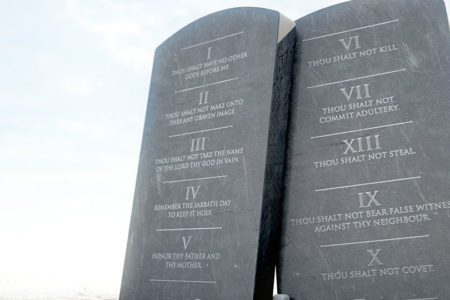A Definition and Kinds of Divine Revelation
In the study of biblical doctrine, it is essential to begin with the doctrine of the Bible (bibliology), which consists of commentary on the Bible derived from the Bible itself. Since all other biblical doctrines are derived from the Bible, the doctrine of the Bible itself is the foundation upon which all the other doctrines are based. If the Bible presents error concerning itself, then all the rest of biblical doctrine rests upon a faulty foundation and is thereby subject to question.
The Bible professes to be the written record of truths revealed by God to mankind. In light of this claim, the study of the doctrine of the Bible is introduced with an examination of the subject of divine revelation, starting with its definition.
A Definition of Divine Revelation
To establish a definition of divine revelation, we must observe several things.
The Biblical Words for Revelation
The major Hebrew Old Testament verb related to revelation, galah, had the basic meaning “to uncover” and such derivative meanings as “to show, to reveal, to make known.”1
The most significant Greek New Testament verb associated with revelation, apocalupto,2 meant “to uncover, reveal, disclose, bring to light.”3
The meanings of both of these words indicate that revelation involves the uncovering of knowledge.
The Difference Between Revelation and Discovery
There is a significant difference between revelation and discovery of knowledge. When discovery takes place, the receiver of knowledge is active. He is uncovering the knowledge by himself. It is not being uncovered for him by another. Thus, discovery can involve just one person and a body of knowledge.
By contrast, when revelation occurs, the receiver of knowledge is passive. Knowledge is uncovered for him by another. Thus, revelation always involves at least two (the revealer and the receiver) and a body of knowledge. In the case of divine revelation, the revealer is God and the receiver is human. In line with this, Albrecht Oepke, wrote, “In the strict sense revelation is always and everywhere the act of God. No one has a right to it simply because he is a man.”4
The Object of Revelation
The object of revelation is what is revealed. When revelation takes place, that which is revealed is a body of knowledge that formerly had been hidden from the receiver of knowledge. Thus, Oepke indicated that revelation involves “the unveiling of what is hidden.”5
When divine revelation occurs, the object of revelation is a body of knowledge that formerly had been hidden from mankind and that mankind could never discover on its own, no matter how much time is given to try every possible means. If God had not chosen to uncover that knowledge, mankind would be ignorant of it forever. This object of divine revelation is indicated in at least two New Testament passages.
1 Corinthians 2:6–10: In the first five verses of 1 Corinthians 2, Paul asserted that when he came to the Corinthians to minister, he did not present the philosophical wisdom of mankind to these Greeks who loved such information. He purposely avoided giving his hearers what they desired because he wanted their faith to rest upon the enduring foundation of God’s power, not upon the shaky wisdom of mankind, which is continually changing as one philosophical fad is exchanged for another.
Beginning with verse 6, Paul hastened to declare that although he did not present philosophical wisdom to the Corinthians, he did give them wisdom rather than ignorance. But the wisdom he presented was not the naturalistic, man-centered wisdom characteristic of this age, nor was it the wisdom of authoritative officials who direct the affairs of the present world system. Their wisdom is short-lived because they are temporary.
The wisdom Paul spoke of was God’s (v. 7). He declared that he spoke God’s wisdom in a mystery. In the New Testament, the word mystery means “the secret thoughts, plans, and dispensations of God which are hidden [from] the human reason, as well as [from] all other comprehension below the divine level, and hence must be revealed to those for whom they are intended.”6 Paul was asserting that the divine wisdom that he presented was in the form of a body of knowledge that had been hidden from mankind, and that mankind could not discover it through its natural resources.
Paul made this assertion clear by giving four additional descriptions of God’s wisdom. First, it was “the hidden wisdom.”
Second, it was “ordained” (lit., foreordained) by God “before the ages.” God had determined this body of knowledge before Earth’s history began, and thus He possessed this knowledge from eternity past. As a result, this wisdom had been hidden from mankind, but not from God.
Third, even all the authoritative officials who direct the affairs of the present world system were totally ignorant of this wisdom (v. 8). Paul gave the following proof of their ignorance: If they had known this wisdom of God, would not have crucified Jesus Christ, “the Lord of glory.” They would have recognized who He was and His significance.
Fourth, this divine wisdom cannot be discovered by mankind through its natural resources (v. 9). On the basis of Isaiah 64:4, Paul indicated that the human senses, such as sight and hearing, are incapable of uncovering this knowledge. In addition, he asserted that human reason (“the heart of man”) cannot perceive it. The Scriptures often regard the heart “as the organ of thinking.”7 For example, they speak of a man thinking in his heart (Prov. 23:7), people understanding with their hearts (Mt. 13:15), and evil thoughts proceeding out of the heart of man (Mk. 7:21).
This teaching of Paul posed a potential problem. If mankind could not discover this wisdom through the use of the human senses and ability to reason, how did Paul obtain it? Was he some kind of supersaint? Did he possess extrasensory perception? He set the record straight by declaring that he obtained this divine body of revelation from God (v. 10). He did not acquire it through some human resource that he possessed.
Ephesians 3:3–11: Paul recorded significant truths concerning Jesus Christ. Apparently he anticipated that his readers would be so impressed with them that they would wonder how he obtained them. So that they would understand the source of these truths, he declared that he had received them by revelation from God (vv. 3–4). Through the use of the terms known and knowledge, Paul signified that it was a body of knowledge that was revealed to him. Three times in Ephesians 3, Paul called this revealed body of knowledge “the mystery” (vv. 3, 4, 9). In addition, he indicated a relationship between this body of knowledge and “the manifold wisdom of God” (v. 10).
Paul taught that this body of knowledge corresponded to God’s eternal purpose (v. 11). Thus, God possessed it through past ages of time, but it was hidden from mankind until God revealed it to His apostles and prophets in New Testament times (vv. 5, 9).
The specific content of this body of knowledge to which Paul referred in Ephesians 3 was not the fact that Gentiles would be saved. That fact was not hidden from mankind in the ages before New Testament times. All those who were saved before Abraham were Gentiles (e.g., Abel, Enoch, Noah, and his wife), and a number of Israel’s Old Testament prophets referred to Gentile salvation.
Instead, the content of “the mystery” in Ephesians 3 indicated that there would be a time during which Gentile believers of the gospel would be brought together as equals with Jewish believers to form one body, the church, and would be made joint heirs and joint partakers of God’s promise in Christ with Jewish believers (vv. 6–10; cf. Eph. 2:11–22; Col. 1:25–27). In line with this, G. Bornkamm wrote, “In Eph. 3:4ff. the mystery is the share of the Gentiles in the inheritance, in the body of the Church, in the promise of Christ. This joining of Jews and Gentiles in one body under the head of Christ is a cosmic eschatological event.”8
Through his treatment of the concept of mystery in 1 Corinthians 2 and Ephesians 3, Paul taught that the object of divine revelation is a body of knowledge that formerly had been hidden from mankind and that mankind could never discover on its own. For this reason Bornkamm stated,
The mystery is not itself revelation; it is the object of revelation … revelation discloses the mystery as such. Hence the mystery of God does not disclose itself. At the appointed time it is in free grace declared by God Himself to those who are selected and blessed by Him.9
The Resultant Definition
On the basis of what has been observed concerning the biblical words for revelation, the difference between revelation and discovery, and the object of revelation, it is now possible to form a definition of divine revelation, which is as follows: the uncovering by God for mankind of a body of knowledge formerly hidden from mankind and totally undiscovered by mankind.
The Kinds of Divine Revelation
The Scriptures indicate two kinds or categories of divine revelation.
Theologians have assigned titles to them.
General revelation is God’s uncovering of knowledge through means available to all mankind in general.
Special revelation is God’s uncovering of knowledge through special means not always available to all mankind in general.
Now that the kinds of divine revelation are defined, they shall be examined in more detail. The next article will begin to examine general revelation.
ENDNOTES
- Bruce K. Waltke, “galah,” Theological Wordbook of the Old Testament, Vol. I (Chicago: Moody Press, 1980), pp. 350-51.
- Albrecht Oepke, “Apocalupto,” Theological Dictionary of the New Testament, Vol. III (Grand Rapids: Wm. B. Eerdmans Publishing Company, 1965), p. 591.
- William F. Arndt and F. Wilbur Gingrich, A Greek-English Lexicon of the New Testament (Chicago: The University of Chicago Press, 1957), p. 91.
- Oepke, “Apocalupto,” Theological Dictionary of the New Testament, Vol. III, p. 574.
- Ibid., p. 583.
- Arndt and Gingrich, A Greek-English Lexicon of the New Testament, p. 532.
- Ibid., 50.
- G. Bornkamm, “musterion,” Theological Dictionary of the New Testament, Vol. IV (Grand Rapids: Wm. B. Eerdmans Publishing Company, 1967), p. 820.
- Ibid., pp. 820-21









Fantastic. It is nice to see fellow mankind open it’s mind to these sorts of things. While none of us may have answers… This sure is better than fighting with or subverting each other. I look forward to your articles kind friend. Learning is amongst the most precious encounters. I am grateful I stumbled across this. I have been piqued.